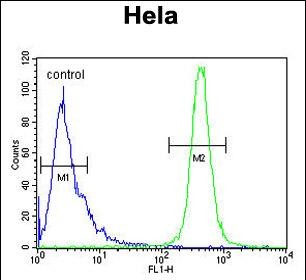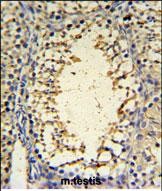


| WB | 1/1000 | Human,Mouse,Rat |
| IF | 咨询技术 | Human,Mouse,Rat |
| IHC | 1/100-1/500 | Human,Mouse,Rat |
| ICC | 技术咨询 | Human,Mouse,Rat |
| FCM | 1/10-1/50 | Human,Mouse,Rat |
| Elisa | 咨询技术 | Human,Mouse,Rat |
| Aliases | U3 small nucleolar ribonucleoprotein protein IMP3, U3 snoRNP protein IMP3, BRMS2, IMP3, C15orf12, MRPS4 |
| Entrez GeneID | 55272 |
| WB Predicted band size | 21.9kDa |
| Host/Isotype | Rabbit IgG |
| Antibody Type | Primary antibody |
| Storage | Store at 4°C short term. Aliquot and store at -20°C long term. Avoid freeze/thaw cycles. |
| Species Reactivity | Human, Mouse |
| Immunogen | This IMP3 antibody is generated from rabbits immunized with a KLH conjugated synthetic peptide between 156-184 amino acids from the C-terminal region of human IMP3. |
| Formulation | Purified antibody in PBS with 0.05% sodium azide. |
+ +
以下是关于IMP3抗体的3篇参考文献及其摘要概述:
---
1. **文献名称**:*IMP3 is a novel biomarker for triple-negative invasive mammary carcinoma*
**作者**:Zheng W, et al.
**摘要**:该研究通过免疫组化分析发现,IMP3在三阴性乳腺癌中高表达,并与肿瘤侵袭性和不良预后显著相关,提示其可作为此类癌症的诊断标志物及潜在治疗靶点。
---
2. **文献名称**:*IMP3 expression in ovarian serous carcinoma: A clinicopathological study*
**作者**:Li D, et al.
**摘要**:研究检测了IMP3在卵巢浆液性癌中的表达,发现其高表达与晚期肿瘤分期、淋巴结转移及患者生存率降低相关,表明IMP3可作为预测卵巢癌预后的独立生物标志物。
---
3. **文献名称**:*IMP3 as a prognostic marker in renal cell carcinoma*
**作者**:Jiang Z, et al.
**摘要**:该研究通过组织芯片分析发现,IMP3在肾透明细胞癌中显著高表达,且与肿瘤分级、转移风险升高相关,提示其可能用于指导肾癌患者的临床管理。
---
4. **文献名称**:*IMP3 promotes hepatocellular carcinoma progression through mRNA stabilization*
**作者**:Yuan RH, et al.
**摘要**:分子机制研究表明,IMP3通过结合并稳定促癌基因mRNA(如COX-2和MMP9),促进肝细胞癌的增殖和侵袭,揭示了其在癌症进展中的功能作用。
---
以上文献涵盖了IMP3在诊断、预后及分子机制中的研究,适用于肿瘤学领域参考。
IMP3 (Insulin-like Growth Factor 2 mRNA-Binding Protein 3), also known as IGF2BP3. is a member of the conserved RNA-binding protein family involved in mRNA transport, stability, and translation. Initially identified for its role in embryonic development, IMP3 is minimally expressed in most adult tissues but re-emerges in various malignancies. Its expression is linked to cell proliferation, migration, and tumor aggressiveness, particularly in cancers like pancreatic, ovarian, and hepatocellular carcinoma.
The IMP3 antibody is a critical tool in research and diagnostics, enabling detection of IMP3 protein overexpression in tumor tissues via immunohistochemistry (IHC) or Western blot. Elevated IMP3 levels correlate with poor prognosis, metastasis, and resistance to therapy, making it a potential biomarker for cancer progression. Additionally, IMP3 antibodies help study molecular mechanisms, such as its interaction with oncogenic mRNAs (e.g., IGF2. MYC) or signaling pathways (e.g., Wnt, KRAS), providing insights into tumorigenesis.
Clinically, IMP3 antibody-based assays aid in differentiating malignancies from benign lesions and guiding therapeutic strategies. Its specificity and relevance in cancer biology continue to drive investigations into targeted therapies and prognostic models. However, standardized protocols for IMP3 detection and interpretation remain essential to ensure diagnostic accuracy across studies.
×